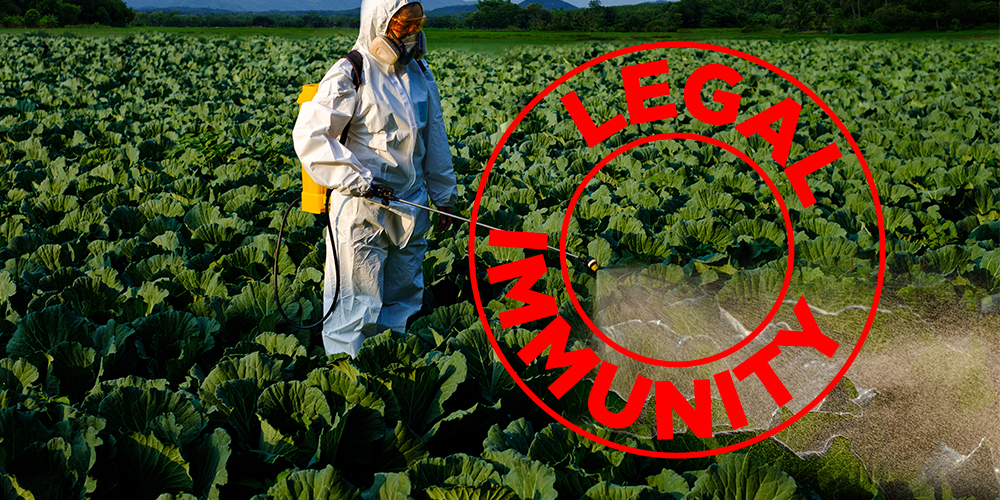The agrochemical industry is at it again, working state by state to shield itself from legal accountability for the damage its products cause. If successful, these efforts would rob individuals, farmers, and communities of their right to sue pesticide manufacturers for health problems linked to exposure to toxic chemicals like glyphosate, the active ingredient in Roundup. Action Alert!
Listen to the audio version of this article:
THE TOPLINE
- Pesticide companies, led by Bayer/Monsanto, are lobbying for laws that grant them immunity from lawsuits related to health harms caused by toxic chemicals like glyphosate.
- These corporate-backed bills have been introduced in multiple states, with additional federal petitions aiming to prevent states from enacting stricter pesticide safety regulations.
- If passed, these laws would leave farmers, workers, and consumers without legal recourse, removing incentives for pesticide companies to disclose risks or develop safer alternatives.
Pesticide companies, led by Bayer/Monsanto, are aggressively lobbying for laws that would block lawsuits against them, using the argument that as long as the Environmental Protection Agency (EPA) approves their labels, they should be immune from legal liability. This strategy mirrors the legal protections given to vaccine manufacturers in 1986 but is even more extreme—there would be no fund for victims, no court for appeals, just complete immunity for Big Chem.
So far, these corporate-backed bills have been introduced in several states (including Georgia, North Dakota, Iowa, Missouri, Mississippi, Oklahoma, Tennessee, Florida, and Wyoming), with drafts circulating in over 20 more. These laws would prevent people from suing pesticide manufacturers for failing to warn consumers about the dangers of their products—even if those dangers are well-documented.
As Rob Verkerk, PhD, of the Alliance for Natural Health warns:
Getting EPA approval for a pesticide is no different from FDA approval for a drug or vaccine—it does not guarantee safety, effectiveness, or necessity. In reality, most pesticides and pharmaceuticals are inherently hazardous to humans and other organisms. Worse still, regulatory approvals often rely almost entirely on industry-produced data, which is then reviewed by agency staff with deep ties to the very companies they are supposed to regulate. Granting legal immunity to pesticide manufacturers would be like issuing a blank check for indiscriminate use, rather than ensuring responsible application. Bayer, the world’s largest chemical company, is blatantly leveraging its economic and political power for self-interest—at the expense of both people and the planet.
Spotlight on Iowa: The “Cancer Gag Act”

One of the fiercest battlegrounds is Iowa, where opposition groups have dubbed the proposed law the “Cancer Gag Act” due to the state’s alarmingly high cancer rates. Iowa ranks second in the nation for new cancer cases, a statistic many fear is linked to heavy pesticide use.
Despite overwhelming evidence linking pesticide exposure to cancer, the Iowa Senate recently voted to advance the bill. In response, concerned citizens and farmers have mobilized in opposition.
The Federal Play
While pushing these state-level bills, Bayer/Monsanto and its allies are also seeking federal legislation that would further cement their immunity. A petition filed by 11 state Attorneys General seeks changes to federal law that would bar any state-level pesticide safety requirements that differ from the EPA’s findings. This means that even if independent studies prove a pesticide is harmful, states would be powerless to act against it.
Some Good News?
There are some encouraging signs that we are not on a one-way track to a pesticide-laden, genetically modified food future. A recent US District Court ruling vacated a USDA rule that loosened regulatory requirements for biotech products. Previously, the focus was on how a plant was created; if it was through genetic modification, regulatory oversight was triggered. Under the now-vacated rule, the USDA was given leeway to judge, on a case-by-case basis, whether the plant variety posed risks as a “plant pest” or “noxious weed.” Clearly this was a gift to the biotech industry. We’re glad to see the courts side with people over corporations.
What’s at Stake
If these laws pass, pesticide manufacturers will have free rein to produce and sell dangerous chemicals without consequence. Farmers, farmworkers, and consumers exposed to these toxins would have no legal recourse. Without the threat of lawsuits, these companies would have little incentive to invest in safer alternatives or disclose known risks.
Action Alert! Write to your state legislature and tell them to oppose efforts to provide legal immunity to pesticide manufacturers! Please send your message immediately.





No immunity for agro-chemical companies! We want accountability for these dangerous products!